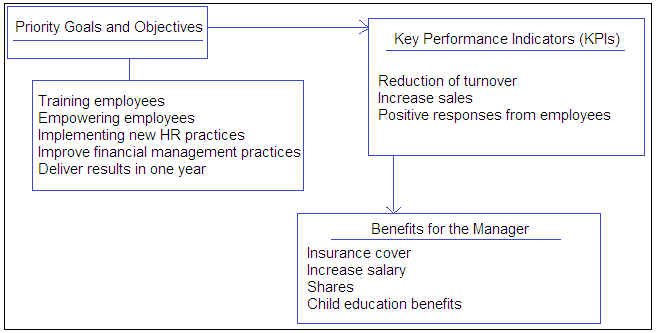Priority Objectives
The newly-recruited manager should be able to transform the situation at the Preston store. The store is currently facing various challenges and obstacles that affect the level of performance. This situation explains why the store manager should focus on specific goals or priorities. Such priorities should be aimed at addressing the major challenges affecting the store’s performance (Chipeta 233). The new manager should ensure the store is on the right path towards realizing its goals. The chart presented below outlines the core objectives, performance measures, and rewards for the store manager.

To begin with, the manager should train all the staff members from diverse backgrounds. The training approach should equip the workers with the best skills and competencies. The second role is to empower the employees using the most desirable resources and motivations. This strategy will reduce the level of employee turnover rate and increase performance. The new store manager will be required to monitor and support the performance of different workers (Zia 32). The manager will empower different marketers, promote the best logistical operations, monitor inventory, and increase sales.
The manager will also be required to implement the best human resource (HR) practices. Such practices will include proper management, motivation, and empowerment of every employee. The leader should also report directly to the regional manager (Ajala 143). The manager should also address the major challenges affecting the targeted workers. The ultimate goal should be to maximize the profitability of the store. These goals and priority objectives should be achieved within the next year. The manager should also collaborate with her followers before relocating the store.
The other objective is financial management. The manager should liaise with different employees in the store in order to undertake the best financial management practices. By so doing, the manager will be able to monitor the engagement and performance of different employees. She should also work hard to increase the store’s profits (Ajala 144). Positive financial measures will ensure the store is on the right path towards realizing its goals.
Key Performance Indicators
The newly-employed manager should work hard to deliver desirable results. The regional manager should monitor the contribution of every individual throughout the targeted one year. The first key performance indicator (KPI) is the level of employee turnover rate. The lack of morale and absenteeism are clear indications that the employees have been unhappy with the previous leadership (Zia 35). The new manager should therefore work hard to transform this situation. The manager’s contributions should eventually increase morale.
The second KPI to consider is the volume of sales recorded at the store. Current statistics indicate that the Preston store has been performing dismally in terms of sales. An effective managerial approach will result in increased sales. The newly-hired manager should be able to increase the sales recorded at the store. Increased sales will indicate that the store is functioning efficiently. On the other hand, reduced sales will indicate that the manager is doing very little to produce the best results. Increased sales will eventually make the store profitable and more competitive.
The other KPI is the nature of responses presented by the workers after the end of the year. This is possible because the company undertakes an annual employee opinion survey. The employees in the store will be satisfied with the working environment if the managerial strategy is effective. Consequently, the level of commitment, teamwork, and collaboration will increase significantly (Zia 36). These indicators will be used to determine if the manager is successful or not. This observation will make it easier for the regional manager to make the most appropriate decisions.
Incremental and Long-Term Benefits
The targeted manager is expected to transform the performance and profitability of the store. Managers who work hard and deliver positive results should also be rewarded accordingly. Several rewards should be availed to the manager if she is successful in achieving the targeted goals (Ajala 143). To begin with, monetary rewards can be appropriate if the manager delivers positive results. For instance, the manager can get new rewards and bonuses (Zia 37).
The other long-term benefit that can be used to reward the manager is increasing her salary. Maslow’s hierarchy of needs theory supports the use of incentives to motivate an individual. Increasing the manager’s salary will ensure she is committed to realizing every targeted goal. The regional manager can also use different initiatives such as insurance cover and child education benefits. The manager can also get a certain percentage of the company’s shares. Such shares will motivate the manager and make it easier for her to promote the most desirable practices (Chipeta 236). Similarly, every hardworking employee at the store should be presented with similar benefits. The employees at the store will also be ready to support every targeted business objective. This approach will make it easier for the firm to achieve its business goals.
Works Cited
Ajala, Emmanuel. “The Influence of Workplace Environment on Workers’ Welfare, Performance and Productivity.” The African Symposium: An online journal of the African Educational Research Network 12.1 (2012): 141-149. Print.
Chipeta, John. “Factors That Affect Staff Morale in Tertiary Hospitals in Malawi: A Case Study of Kamuzu Central Hospital.” Journal of Human Resource and Sustainability Studies 2.1 (2014): 230-238. Print.
Zia, Sayma. “Effects of Organizational Team Building on Employees’ Morale and Job Retention.” Business Management Dynamics 1.7 (2011): 31-37. Print.